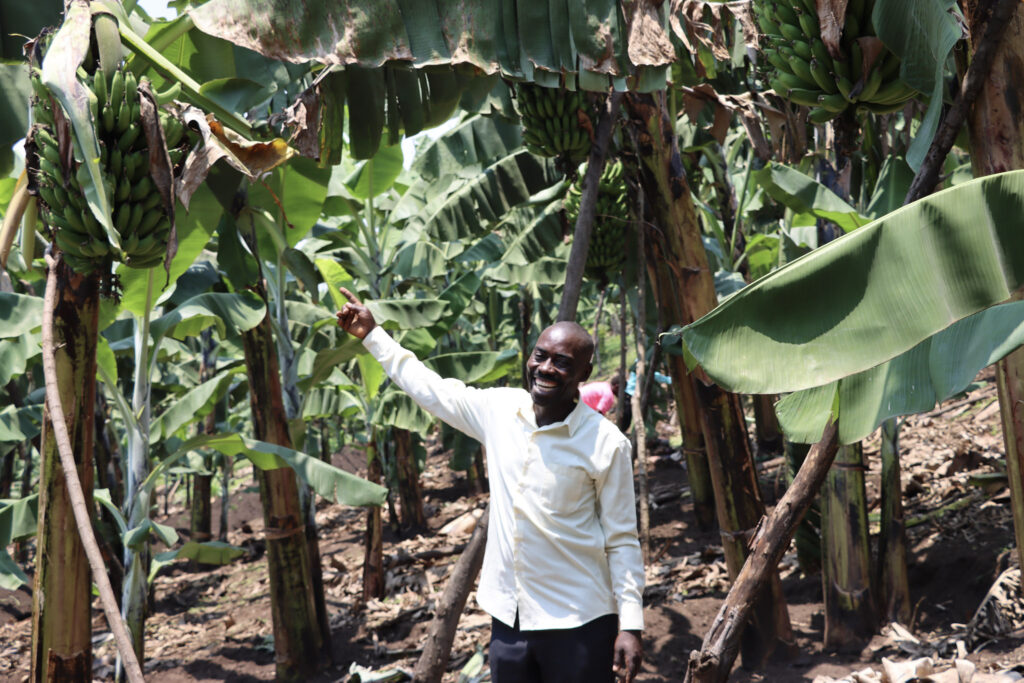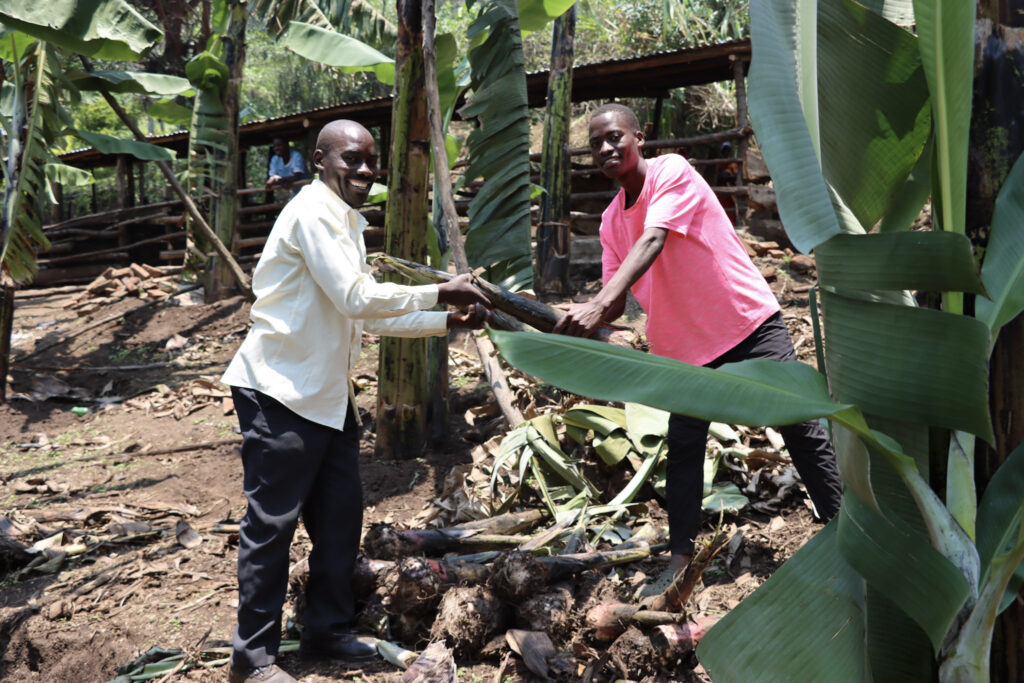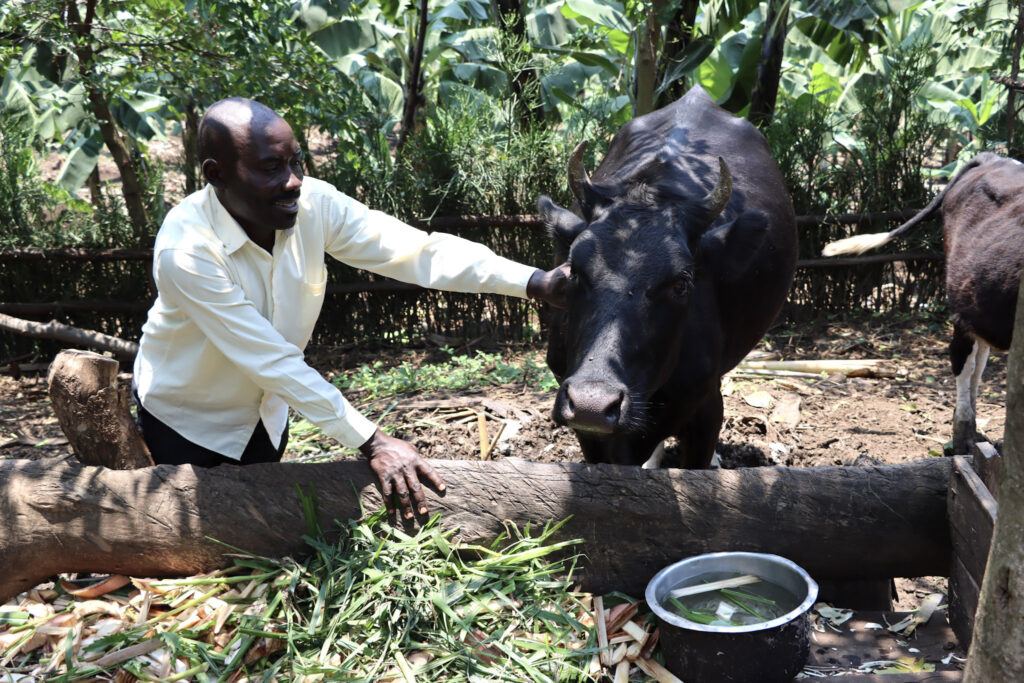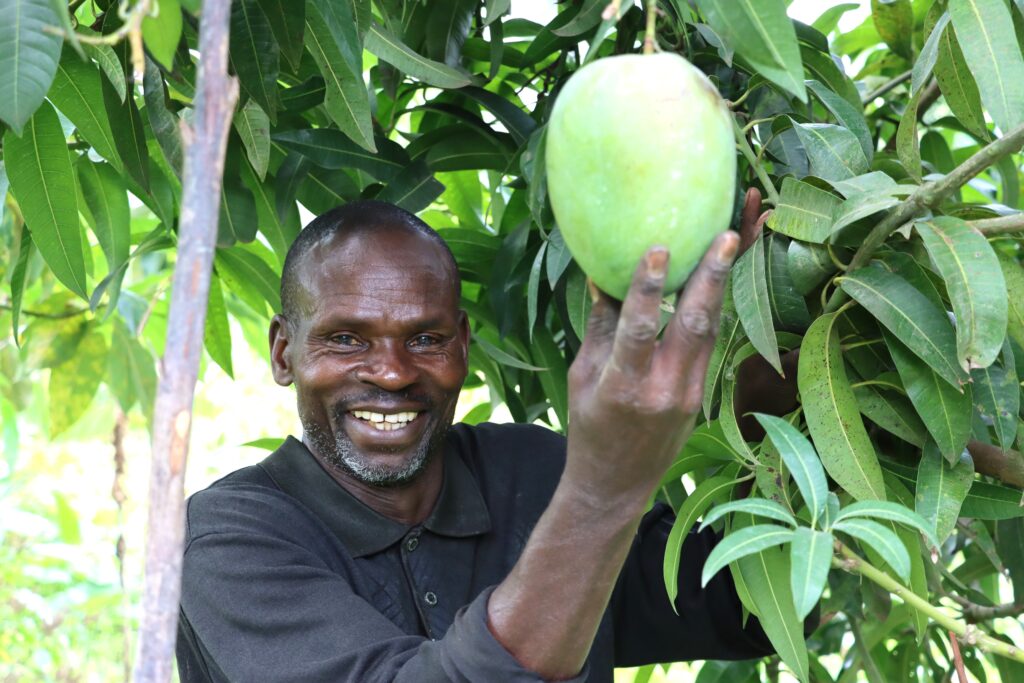
Green bananas are a valuable staple food, a cultural cornerstone, and a notable source of income in Uganda. Every day, they are served steaming in homes, restaurants, and hotels, and demand for them is ever growing. Recognizing both the cultural significance and economic potential, Cliff Rutaisire, a forward-thinking farmer from Rwano Village, decided to invest in green banana farming.
“We are…training [farmers] in best agronomic practices, post-harvest handling, value addition, and marketing. With this, smallholder farmer households are now producing more, achieving food security, and earning better incomes…”
James Kwesiga, BRIGHT’s Sustainable Land Use and Crop Production Field Officer
Cliff, together with his wife Esther Kemirembe and four children, started by planting 750 green banana shoots on a 2.5 acre plot. However, soil and nutrient erosion and suboptimal agronomic practices, such as inadequate plant spacing and failure to weed, prune, and remove offshoots, inhibited their efforts and led to disappointing harvests.
The harvested banana bunches were consistently small, each fetching not more than 7,000 Uganda shillings (UGX, approximately U.S. $2.00). “The soil nutrients would wash away with rain,” Cliff recalled. “The plants were stunted, and the returns were discouraging.”
A turning point for their green banana cultivation came when Cliff joined training sessions on improving agronomic practices for smallholder farmers organized by the Building Resilience and Inclusive Growth of Highland farming systems for rural Transformation (BRIGHT) project.

“We were trained in the use of trenches and grass bunds to prevent soil and nutrient erosion. We also learned how to space our crops, weed gardens, apply manure and fertilizers, and sell collectively to secure better prices and access reliable markets,” said Cliff.
He added that BRIGHT supported his and his fellow farmers’ participation in a learning visit to Buloba Farmers’ Institute, where they gained hands-on experience in intercropping, year-round soil and water conservation, and the use of improved, climate-resilient varieties such as the Nasaba green banana.
Cliff and his family applied these lessons with dedication. Today, their garden is a model for transformation. Neatly spaced rows of green bananas thrive in nutrient-rich black soil, protected by well-dug trenches and grass bunds. He has also diversified his farming by acquiring goats, pigs, and cows, which provide organic manure to enrich the soil.
“Cliff’s family is one of the 106,560 farming households we are empowering to restore and conserve soils and landscapes through trenching, responsible use of fertilizers and manure, and other sustainable practices. We are also training them in best agronomic practices, post-harvest handling, value addition, and marketing. With this, smallholder farmer households are now producing more, achieving food security, and earning better incomes, while actively contributing to the development of their communities and our country,” explained James Kwesiga, BRIGHT’s Sustainable Land Use and Crop Production Field Officer.
The results of the family’s efforts speak for themselves. They now harvest at least 30 large bunches of green bananas every month, each selling for UGX 30,000 (U.S. $8.55) to 50,000 (U.S. $14.25) – over four times the prices they’d once earned.

Their efforts have yielded not just food security, but financial stability. With proceeds from their garden, Cliff and his wife have invested in livestock, enrolled their children in private schools, and are saving to purchase six additional acres of land to expand their garden and build a bigger permanent home.
The family also regularly hosts the Rwano Agahikaine Group, a farmers’ group that shares knowledge on agronomic practices and post-harvest handling. Cliff and his family contribute green bananas to the group to produce banana wine, a value-adding venture that boosts the group’s collective income.
Bunyangabu District Agriculture Officer Gerald Tumwesigye commended BRIGHT for complementing government efforts. He remarked, “Farmers, especially in Kabonero sub-county where the hills had been overused and left bare, were facing challenges like soil erosion and floods… But with support from the BRIGHT project, these hills have been restored, and farmers are now reaping the benefits.”
Additionally, farming households like Cliff’s are crucial to Uganda’s overall food security and economic growth, and their contributions align with significant policies, such as the Fourth National Development Plan, with its focus on agricultural productivity and agro-industrialization.
Cliff’s journey reflects the transformative power of knowledge, resilience, and community-led development. When combined with BRIGHT’s support and training, his family’s dedication met with success, and their newly diversified green banana farming enterprise is thriving.
The Building Resilience and Inclusive Growth for Highland Farming Systems for Rural Transformation (BRIGHT) project, funded by the Netherlands Ministry of Foreign Affairs through the Embassy of the Kingdom of the Netherlands, seeks to build the resilience capacity of farm households and farming systems in Uganda to increase income and food and nutrition security of all farmers and transform households from subsistence to more market-oriented in Kigezi, Mount Elgon, and Rwenzori regions. The project is being implemented by the International Fertilizer Development Center (IFDC) in cooperation with Agriterra, the Uganda Ministry of Agriculture, Animal Industry and Fisheries (MAAIF), the National Agricultural Research Organization (NARO), district local governments, and private sector partners.






